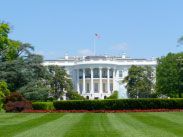 When I decided to apply for a Fulbright grant, the choice for a host institution was not so difficult. The Center on Democracy, Development and the Rule of Law (CDDRL) at Stanford University is the place to be for every scholar interested in the topic of democratization. I had spent many years studying the European Union as a democracy promoter, and my research comparing EU and US democracy assistance in Ethiopia had sparked my interest in the decision-making process behind US democracy assistance. Hence, the objective of my Fulbright fellowship was to learn about US democracy assistance and, at the same time, to share my expertise on EU democracy assistance.
When I decided to apply for a Fulbright grant, the choice for a host institution was not so difficult. The Center on Democracy, Development and the Rule of Law (CDDRL) at Stanford University is the place to be for every scholar interested in the topic of democratization. I had spent many years studying the European Union as a democracy promoter, and my research comparing EU and US democracy assistance in Ethiopia had sparked my interest in the decision-making process behind US democracy assistance. Hence, the objective of my Fulbright fellowship was to learn about US democracy assistance and, at the same time, to share my expertise on EU democracy assistance.
Although the CDDRL seemed the ideal place to undertake my postdoctoral research, my goal was to go into the details of how democracy promotion projects come about and the best way to do this was to talk with the ‘democracy promoters’ themselves. To get in touch with the appropriate people, I got help from the fellows and professors at the CDDRL. The next step was to go to the center of US decision-making: Washington, D.C. The first problem I encountered when arranging this research trip was to find funding. As I planned to stay for three weeks, I was not eligible for the Fulbright Occasional Lecturer Fund. I decided to plan my visit to Washington right after a conference in Baltimore, and to schedule a visit to friends in New York right after the study visit, so my flight served multiple purposes. As for housing, to my disappointment Washington proved to be quite expensive. Luckily, I was able to sublet my room near the Stanford campus, and on the website airbnb.com I found a nice apartment with a great roommate.
Another difficult task was to find a host institution. I contacted several universities and think-tanks, but most of them were short on office space. However, after many e-mails and suggestions for institutions, I came in contact with the Center on Transatlantic Relations (CTR), which is part of the Paul H. Nitze School of Advanced International Studies, Johns Hopkins University. The CTR is used to receiving short-term visiting scholars, and they had office space available. I am extremely grateful to them for hosting me, not only for the very conveniently located office, but also for the great atmosphere and the social activities with coworkers. 
However, there were some practical strings attached to my visiting fellowship at the Center for Transatlantic Relations. To remain properly registered in the immigration system, I needed a new DS 2019 from the Council for the Exchange of International Studies mentioning my new host institution. For this I needed approval from the Fulbright Commission in Belgium and from my program director at the CDDRL. Both were very supportive, so that was arranged relatively easily.
In the end, it all worked out and my research visit to Washington was very useful. I conducted 26 interviews with experts on US democracy assistance from think-tanks, NGOs, government agencies and academia. Because of this very intensive interview schedule, I was able to learn a lot about US democracy assistance in a period of only three weeks. The interviewees were very interested in my research; many times they even asked me about my opinion and about European practices. Hence, my double objective to learn and share knowledge was reached.
I would definitely recommend other Fulbright scholars, particularly those who stay for a longer period, to do a short visiting fellowship at another university if that is useful for their research. The practical issues should not keep you from going to the places where you can learn the most!
Karen Del Biondo, Fulbright-Schuman Grantee 2012-2013
